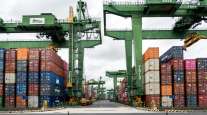Trump Plans to Slap 10% Tariff on $200 Billion of Chinese Goods, Sources Say

The Trump administration will announce as early as Sept. 17 that it is imposing a 10% tariff on $200 billion of Chinese goods, which Beijing already has said it will retaliate against, according to three people familiar with the decision.
The rate is less than half of the 25% level the administration had been considering. Still, American consumers could start feeling the cost of the tariffs for everyday goods, as the latest move brings all Chinese imports subject to a new tariff to $250 billion, about half of China’s shipments to the United States last year.
President Donald Trump is barreling ahead with his vow to punish China for alleged unfair trading practices, despite an invitation this month from Treasury Secretary Steven Mnuchin to restart trade talks with Beijing. Chinese officials have signaled they’ll refuse to meet with Mnuchin if this next round of tariffs is imposed, according to two people familiar with the discussions.
The White House had no immediate comment.
American businesses have come out strongly against the tariffs, saying they have the potential of raising retail prices. Apple Inc. said last month the proposed duties on $200 billion cover a wide range of products used in its U.S. operations.
Stocks Lower
U.S. stock futures edged lower, Asian equities slumped and European shares fluctuated amid investor concerns a heightened trade war will crimp corporate profits and undermine economic growth. The dollar declined.
Tariffs have put the U.S. in a very strong bargaining position, with Billions of Dollars, and Jobs, flowing into our Country - and yet cost increases have thus far been almost unnoticeable. If countries will not make fair deals with us, they will be “Tariffed!” — Donald J. Trump (@realDonaldTrump) September 17, 2018
The president early on Sept. 17 seemed to undermine any efforts for a negotiated solution, saying tariffs have bolstered the U.S. bargaining position, while cost increases to consumers have been negligible and warned of more levies.
“Tariffs have put the U.S. in a very strong bargaining position, with Billions of Dollars, and Jobs, flowing into our Country — and yet cost increases have thus far been almost unnoticeable,” Trump said on Twitter. “If countries will not make fair deals with us, they will be ‘Tariffed!’”
The administration since July has already slapped 25% tariffs on $50 billion of Chinese goods, sparking immediate in-kind retaliation. China has said it will respond to the next round of U.S. levies with retaliatory tariffs on $60 billion of U.S. goods ranging from liquefied natural gas to aircraft.
Distance Beijing
Heaping more duties on Chinese goods will only further distance Beijing from resolving the conflict through a negotiated solution, one of the people said.
The lack of unity within the U.S. administration on trade isn’t new — Chinese and American officials have held a series of talks over the dispute and reached at least one agreement, which subsequently was abandoned by the president. The lack of progress and collapse of that deal have made future negotiations more difficult as it’s unclear who speaks for the U.S. administration and there’s a lack of confidence that any deal will be honored.
White House economic adviser Larry Kudlow has indicated that Trump could be willing to meet face-to-face with China President Xi Jinping to smooth over trade tensions at the United Nations General Assembly later this month or at the Group of 20 nation summit in Argentina in November.
Economists at UBS Group AG say even a 10% tariff would slow the U.S. economy in the fourth quarter by enough to stop the Federal Reserve hiking interest rates again in December.
— With assistance by Jennifer Jacobs




